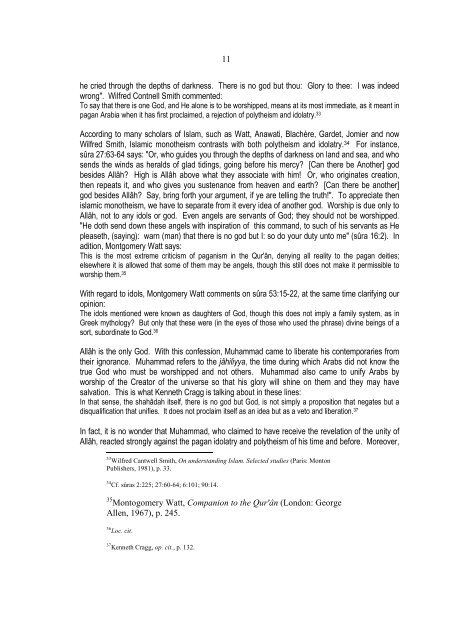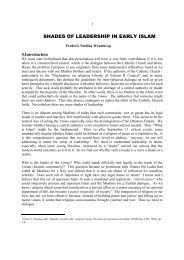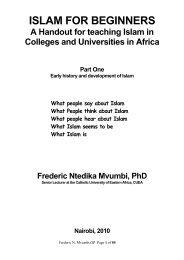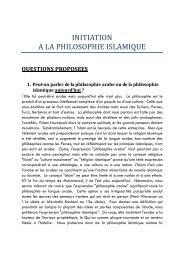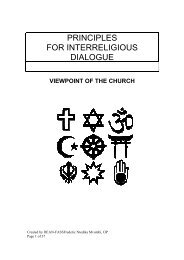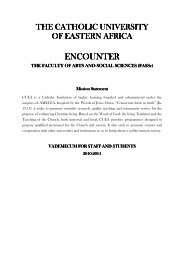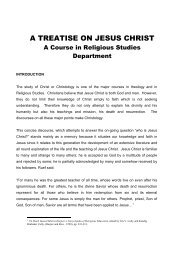INTRODUCTION TO ISLAMIC THEOLOGY.pdf - CUEA
INTRODUCTION TO ISLAMIC THEOLOGY.pdf - CUEA
INTRODUCTION TO ISLAMIC THEOLOGY.pdf - CUEA
You also want an ePaper? Increase the reach of your titles
YUMPU automatically turns print PDFs into web optimized ePapers that Google loves.
11he cried through the depths of darkness. There is no god but thou: Glory to thee: I was indeedwrong". Wilfred Contnell Smith commented:To say that there is one God, and He alone is to be worshipped, means at its most immediate, as it meant inpagan Arabia when it has first proclaimed, a rejection of polytheism and idolatry. 33According to many scholars of Islam, such as Watt, Anawati, Blachère, Gardet, Jomier and nowWilfred Smith, Islamic monotheism contrasts with both polytheism and idolatry. 34 For instance,sûra 27:63-64 says: "Or, who guides you through the depths of darkness on land and sea, and whosends the winds as heralds of glad tidings, going before his mercy? [Can there be Another] godbesides Allâh? High is Allâh above what they associate with him! Or, who originates creation,then repeats it, and who gives you sustenance from heaven and earth? [Can there be another]god besides Allâh? Say, bring forth your argument, if ye are telling the truth!". To appreciate thenislamic monotheism, we have to separate from it every idea of another god. Worship is due only toAllâh, not to any idols or god. Even angels are servants of God; they should not be worshipped."He doth send down these angels with inspiration of this command, to such of his servants as Hepleaseth, (saying): warn (man) that there is no god but I: so do your duty unto me" (sûra 16:2). Inadition, Montgomery Watt says:This is the most extreme criticism of paganism in the Qur'ân, denying all reality to the pagan deities;elsewhere it is allowed that some of them may be angels, though this still does not make it permissible toworship them. 35With regard to idols, Montgomery Watt comments on sûra 53:15-22, at the same time clarifying ouropinion:The idols mentioned were known as daughters of God, though this does not imply a family system, as inGreek mythology? But only that these were (in the eyes of those who used the phrase) divine beings of asort, subordinate to God. 36Allâh is the only God. With this confession, Muhammad came to liberate his contemporaries fromtheir ignorance. Muhammad refers to the jâhiliyya, the time during which Arabs did not know thetrue God who must be worshipped and not others. Muhammad also came to unify Arabs byworship of the Creator of the universe so that his glory will shine on them and they may havesalvation. This is what Kenneth Cragg is talking about in these lines:In that sense, the shahâdah itself, there is no god but God, is not simply a proposition that negates but adisqualification that unifies. It does not proclaim itself as an idea but as a veto and liberation. 37In fact, it is no wonder that Muhammad, who claimed to have receive the revelation of the unity ofAllâh, reacted strongly against the pagan idolatry and polytheism of his time and before. Moreover,33 Wilfred Cantwell Smith, On understanding Islam. Selected studies (Paris: MontonPublishers, 1981), p. 33.34 Cf. sûras 2:225; 27:60-64; 6:101; 90:14.35 Montogomery Watt, Companion to the Qur'ân (London: GeorgeAllen, 1967), p. 245.36 Loc. cit.37 Kenneth Cragg, op. cit., p. 132.


